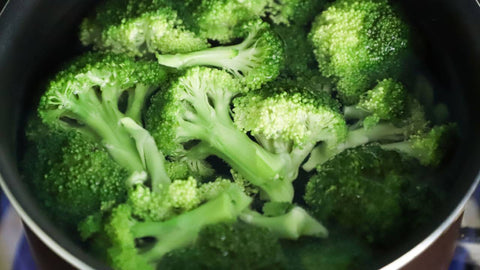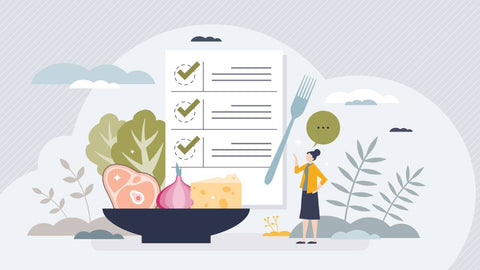How to build a healthy main meal
For some people preparing a healthy meal can be overwhelming and time consuming which may be why Australians are eating fewer home cooked meals. We know that eating home cooked meals more often is frequently associated with better dietary quality including higher fruit and vegetable consumption, and lower body fat levels. Children who eat regular family dinners also tend to consume more fruit, vegetables, vitamins and minerals and fewer fried foods and soft drinks. They also tend to eat healthier as adults.


Before assembling a healthy meal we suggest:
- Organising what meals and recipes you’ll be cooking for the week
- Shop for your ingredients
- Prepare your ingredients
To help simplify the confusion around healthy eating and we have broken down what key food groups to include in your main meals.
1. Protein
Why is protein important? Protein is one of the three macronutrients including carbohydrate and fat. It is the main building block of every single cell in our body. It’s also important to consume protein when you lead an active lifestyle as it helps to repair and strengthen muscles. Protein can also assist with trying to achieve a healthy weight as it helps to keep us full!
What are good sources of protein?
• Lean chicken
• Lean red meat e.g. lamb, beef, pork
• Fish and seafood
• Free range eggs
• Greek yoghurt
• Cheese
• Milk
• Tofu
• Legumes e.g. soybeans, chickpeas, lentils, black beans
• Protein powder e.g. whey protein isolate
2. Fats
Why are fats important? Contrary to popular belief eating fat is not fattening. Fat plays an important role in the body including insulating and protecting your organs. They also help you absorb vitamins A, D, E and K. The body cannot produce certain fats called essential body acids which we need for brain development and inflammation, and so we have to get them from our diet. Fat also helps add flavor to meals as well as keep us full.
What are good sources of fat?
• Nuts e.g. cashews, almonds, pistachio
• Seeds e.g. sunflower seeds, chia seeds, hemp seeds
• Avocado
• Olives
• Extra-virgin olive oil
• Oily fish e.g. salmon, sardines, trout
3 Carbohydrates/ wholegrains / starchy vegetables
Carbohydrates are an important food group as they are our body’s primary source of fuel, especially during moderate to high intensity exercise. They’re also an extremely excellent source of fibre which is the number one fuel for our gut bugs. Whole-grains are a type of carbohydrate, and are one of the healthiest foods we can consume for our health. Consuming wholegrains protects against heart disease, diabetes and many types of cancer. They’ve also been shown to increase life expectancy and have an anti-inflammatory effect in the body.
What are good sources of carbohydrates?
• Sweet potato
• Low GI white potato e.g. Coles Carisma
• Sweet corn
• Basmati, brown or Doongara rice
• Quinoa
• Buckwheat
• Rice noodles
• Spelt
• Teff
• Whole-meal or brown rice pasta
• Sourdough, seeded or light rye bread
• Rolled oats
Here are some tips for including more wholegrains and smart carbohydrates
• Swap ordinary potato mash for sweet potato mash
• Give your pantry a makeover and swap ordinary white pasta, crackers and rice for whole-meal pasta, brown or basmati rice and seeded crackers
• Add barley and quinoa to soups
• Use whole-meal flour in baking and cooking
• Add some ancient grains like quinoa or buckwheat to your favourite salad dish
4. Vegetables and Salad
Vegetables and salad should be the focus and hero of the meal. Aim to include as many different colours and textures as possible. Variety is key! Less than 7% of adults and 5% of kids consume enough vegetables in Australia which is concerning when we know they are essential for our long-term health. A plant-based diet rich in fruit and vegetables is the healthiest way to eat in terms of increasing life-expectancy, achieving a healthy weight and protecting against lots of chronic health conditions such as depression, anxiety, dementia, heart disease and stroke.
Try and aim for 5 serves as a minimum per day. A serve is equivalent to:
• 1⁄2 cup cooked veg
• 1⁄2 cup cooked/dried legumes
• 1 cup salad or leafy greens
• 1⁄2 cup sweet corn
• 1⁄2 medium potato or other starchy vegetables
• 1 medium tomato
Here are some tips for including more vegetables
• Add salad to wraps + sandwiches
• Add spinach, tomato, mushrooms, capsicum and baked beans to eggs
• Grate veggies into sauces
• Batch cook roasted veggies and add them to salads, wraps and omelettes
• Add frozen veggies to meals
• Add lentils and chickpeas to soups
• Add black-beans to Mexican meals such as tacos
Where time become a restraint that prevents you from you preparing healthy meals for you and/or your family, look for ready made meal companies such as Activate Foods to take the effort out of it. Always look to ensure you find healthy ready made meals made with wholefoods and with as little processing as possible. Look at the ingredients to identify if any preservatives or additives are used.
We have high protein meal options for those trying to bulk up or lose weight. Our meals can be tailored to your specific dietary requirements and we always use fresh, locally sourced ingredients. If you want to eat healthy but don't have the time to cook from scratch, our pre-made meals are the perfect solution. You can view our menu here.
More information
Activate Foods
https://www.activatefoods.com.au/
Shop 2 / 222 The Entrance Rd, Erina NSW 2250
Delivering to Sydney, Newcaslte & the Central Coast
Eatsense
https://eatsense.com.au


